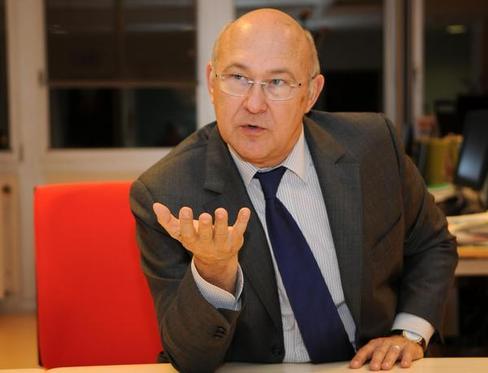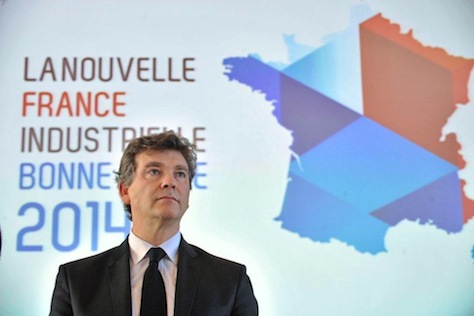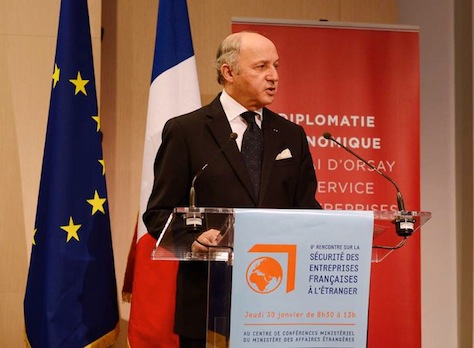Though French president François Hollande on Monday promised a gouvernement de combat in his cabinet reshuffle, it looks like the government he’s chosen might wind up spending more time combatting one another that the myriad economic challenges that France faces.
![]()
Just 48 hours after naming interior minister Manuel Valls, the hard-charging, Roma-busting strongman of the Parti socialiste (PS, Socialist Party) as France’s new prime minister, Hollande announced the rest of his cabinet reshuffle today.
Though the return of Ségolène Royal, Hollande’s partner of three decades and the 2007 Socialist Party’s presidential candidate, is sure to top most headlines, the heart of the cabinet reshuffle are Hollande’s schizophrenic choices for finance minister, Michel Sapin (pictured above), and economy minister, Arnaud Montebourg.
At first glance, Hollande’s new slimmed-down cabinet (16 ministers instead of 20) seems like a kind of ‘team of rivals,’ given that Valls, Montebourg and Royal all campaigned for the Socialist Party’s 2012 presidential nomination — the only major rival not to hold a post in the new government is Martine Aubry, a longtime champion of the party’s left wing and the former minister who introduced France’s 35-hour workweek (a policy that Valls stridently opposes).
But it’s hardly Lincolnesque.
Sapin and Royal are assuming roles they first held 22 years ago, while Montebourg is a leftist whose views are at extreme odds with the economic policy that Hollande and Valls are expected to pursue over the next three years.
Finance minister Michel Sapin
Economy minister Arnaud Montebourg
Sapin will replace outgoing finance minister Pierre Moscovici, and he has a huge mess to clean up. Though it may not be Moscovici’s fault — or even Hollande’s fault, entirely, France’s Socialist government has achieved very little of what it set out to do initially.
Though the government has acknowledged that France needs market reforms to make its economy more competitive, its only legislative result was a relatively weak labor reform that introduces more flexibility on rules for pay and working time for employers during economic downturns. Hollande’s controversial push to increase taxes on high-earners has obscured the government’s budget woes, even as economic growth continues to stagnate and the unemployment rate is elevated (10.4% as of February 2014).
Sapin’s first task will be convincing Brussels to give France more time to bring its budget deficit within 3% of GDP — it’s already been granted a two-year extension, but Hollande’s government likely won’t make its 2015 target. With the European-wide economy showing signs of improvement, Sapin’s next task will be to find a way to ride that recovery to stronger GDP growth and lower unemployment in France. In light of the losses suffered by the Socialist Party in last weekend’s municipal elections, Hollande will almost certainly take another drubbing in the May 25 European elections. But there’s still a long time until the next national elections in spring 2017.
Sapin first served as finance minister between 1992 and 1993, in the later years of president François Mitterand’s Socialist government. In that capacity, he managed to keep France within the European exchange rate mechanism, avoiding the kind of currency crisis that plagued the United Kingdom in September 1992. He also helped to steer France into the Maastricht Treaty, which established the foundations of the eurozone.
More recently, he served as Hollande’s labor and employment minister. In that capacity, Sapin has worked to bring more young people into the workforce, but he has so far failed to reduce the unemployment rate.
Like Moscovici (who is rumored to be in line to become France’s next representative to the European Commission), Sapin is a Hollande confidante. The two were classmates at France’s legendary academy, the École nationale d’administration.
But Hollande’s new economy minister, Montebourg (pictured above), is just to the right of neocommunist Jean-Luc Mélenchon. It’s not entirely clear what Montebourg’s role will be in the new government, but he will have an expanded portfolio that covers industry and the digital economy. His appointment initially seems like a sop to the Socialist Party’s left wing — Montebourg is an ardent anti-austerity, anti-globalization and protectionist leftist.
Hollande, Sapin and Valls are committed to introducing pension reform, perhaps additional liberalization reforms and a payroll tax cut, so it’s hard to know where Montebourg will influence policymaking in the months or years ahead.
Montebourg, who was most recently serving as minister for industrial renewal, might be most famous in the United States for an angry back-and-forth with conservative US businessman Morry Taylor. He also hasn’t been shy to attack European policymakers for crippling the single market’s growth potential, and he once compared German chancellor Angela Merkel to Otto von Bismarck.
Environment/energy/sustainable development minister Ségolène Royal
Royal’s return to the cabinet is certain to set tongues wagging. Hardly two months after the split between Hollande and his new partner, Valérie Trierweiler, Royal (with whom Hollande shares four children) is once again returning to frontline government.
Like Sapin, she served as minister of the environment between 1992 and 1993, and given her wide-ranging experience, it’s a shame that personal drama among Hollande, Royal and Trierweiler kept Royal out of government so long.
It’s been a rough period in the wilderness for Royal. Her party blamed her maverick campaign for losing the 2007 presidential race to Nicolas Sarkozy, though it’s hard to see how anyone could have defeated the ascendant Sarkozy, who then captivated the electorate with promises of rupture from decades of policy ennui.
After narrowly losing the party’s 2008 leadership election by just 42 votes to Aubry, Royal became even more ostracized within the Socialist Party. By the time she contested the 2011 presidential primary, she finished far behind in fourth place with just 6.95% of the vote.
But Royal’s defeat in the 2012 parliamentary elections to renegade Socialist candidate Olivier Falorni was even more embarrassing — despite having Hollande’s support, Trierweiler very publicly endorsed and cheered on Falorni on Twitter. Falorni ultimately won, leaving Royal out of the Assemblée nationale (National Assembly) or Socialist government for the first time since 1988. Had Royal won, she would have had Hollande’s blessing to serve as the National Assembly’s president.
Late last year, Royal (pictured above) attracted widespread ridicule after posing as Delacroix’s ‘Lady Liberty’ in a photo shoot and comparing herself to Joan of Arc in an interview with Le Parisien.
Instead of the break between Hollande and Trierweiler, the break between Hollande and his chief parliamentary ally, the Europe Écologie – Les Verts (EELV, Europe Ecology – The Greens) will be more consequential to French policymaking. Both Green ministers resigned earlier this week in protest of a Valls-led government. The EELV holds 17 seats in the National Assembly thanks to an electoral pact in 2012 with the Socialists. But without the EELV, the Socialists old just 292 seats in the 577-member body — that’s a three-vote margin without Green votes.
Accordingly, her first job as environmental minister will be to bring the Greens back into the good graces of the Valls government.
Interior minister Bernard Cazeneuve
Education minister Benoît Hamon
Justice minister Christiane Taubira
Valls will be replaced as interior minister by Bernard Cazeneuve, formerly the budget minister. Cazeneuve, who initially served as the junior minister for European affairs, replaced Jérôme Cahuzac, who resigned in March 2013 after admitting to having secret offshore bank accounts — one of the more embarrassing scandals of the Hollande era.
His main task as interior minister will be to avoid the kind of controversies that the headstrong Valls often caused, such as the arrest last year of 15-year-old Leonarda Dibrani during a field school trip. The government subsequently deported Dibrani’s family to Kosovo, causing yet another firestorm for Hollande. Cazeneuve might also take a softer approach to integrating Roma immigrants into French society and a less confrontational view with respect to Muslim immigrants.
Benoît Hamon, another young rising star of the party’s left wing, will advance to become education minister — a promotion from junior minister for the social economy. Hamon served as a member of the European Parliament between 2004 and 2009.
Christiane Taubira, the French Guianan justice minister, will also remain in her role. She’s also on the left wing of the party, and she clashed fiercely last year with Valls on several matters. Taubira, who shepherded France’s legal recognition of same-sex marriage, now hopes to enact penal reform that would relax criminal penalties, use more probation in lieu of prison sentences and eliminate minimum sentencing laws for some crimes, even among repeat offenders. Valls, who took a hard line on crime as well as on immigration as interior minister, opposes the reforms, however, which could also create another source of tension in the new government.
Foreign minister Laurent Fabius
Defense minister Jean-Yves Le Drian
Despite Valls’s popularity, perhaps the more effective member of Hollande’s first cabinet was foreign minister Laurent Fabius. Hollande wisely retains Fabius in that role, as well as defense minister Jean-Yves Le Drian, a longtime leftist leader from Bretagne.
Before assuming the role, Fabius was something of a party dinosaur. He’d served as prime minister under Mitterand in the mid-1980s, until his government fell after the revelation of a botched blood transfusion and HIV infection at the height of the AIDS scare.
Despite having Mitterand’s support, Fabius failed to overtake Lionel Jospin in the late 1990s as party leader, and he ultimately became France’s finance minister from 2000 to 2002. But it was his decision to campaign for the ‘no’ vote in the 2005 European constitutional referendum, in opposition to many other Socialist leaders, that seemed to seal his fate as a retread who would end his political career on the party’s left-protectionist fringes.
Instead, in his time as foreign minister Fabius has one of the best records of the Hollande administration. He effectively executed two French military missions in Mali and Centrafrique (the Central African Republic) that are undisputedly successes. In Mali, Fabius organized the French effort to end the Malian civil war, reclaim the north from mostly foreign jihadist forces, organize new elections and facilitate political negotiations with Mali’s northern Tuaregs over greater autonomy from Mali’s central government.
In Centrafrique, after the Séléka coalition ousted president François Bozizé in March 2013, fighting actually worsened, and by the end of the year, the country was embroiled not only in fighting between political and ethnic groups, but also on poisonous Muslim-Christian lines. French peacekeepers have, for now, brought some peace to Bangui, where its interim president Catherine Samba-Panza seems to be moving the country in the right direction.




Well analyzed, Kevin. Only thing I’d take exception to is your neglect of the CICE tax credit, which seems actually to have been effective in cutting unit labor costs last year and will do more as it comes more fully into effect over the next couple of years. So the labor reform was not the “only” successful measure of the Ayrault government, IMHO. But clearly the combination is insufficient to address French firms’ competitiveness problem (which, however, seems to have more to do with narrow corporate profit margins than with labor costs). Another thing worth paying attention to, as a measure of the possible fractiousness of the new cabinet, is the list of spending cuts due by the end of this month–in the context of France’s failure to live up to even the softened reduction of its budget deficit promised to the European Commission last year.